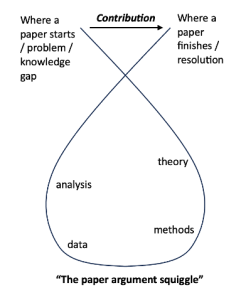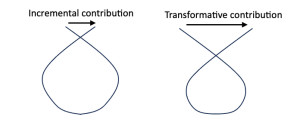One of my first tips for writing is: it’s not about you, it’s about your reader. I think early on in academic we think a lot about writing to express, writing to impress, writing to prove we are smart, writing to critique. These are fine to practice with, but ultimately, I think we probably want to write to persuade, to inform, to help, to move a reader in some direction. So ultimately writing is a communicative act. Yes of course it is still about you, and it is about communicating from you to the reader, but it is mostly about the reader because you wouldn’t even be bothering to publish something if you didn’t have something that reader should hear.
So, I think maybe the most important first step of writing is to imagine the perspective of your audience. Of course once you publish something you don’t have only one single audience member or even audience group. Your work could get picked up and read by many people, it could get forwarded and shared far beyond the group you are writing to. But don’t worry about that too much. Imagine your main proverbial audience. What do they already know? What do they care about? What do they want to know more about? What are they skeptical about? What language could be confusing or alienating for them?
Once you have pictured your audience, I like to think of the journal paper writing task as taking them on a journey. By the end of the paper, you should have made something happen for your reader. The world should look different in some particular way, there should be new gaps of knowledge filled or new insight on a familiar topic. The ways our shared reality is different or differently understood now that your paper exists are your contribution. For your journal paper, your contribution is the distance you’ve moved (conceptually, pragmatically, theoretically) from the place the paper starts and the knowledge gap or problem identified to the place the paper ends and resolves the presented problem. Different types of contribution you could make:
- Theoretical – How has our insight into a topic expanded?
- Qualitative empirical – How has our knowledge and data on a topic expanded?
- Quantitative empirical – What hypotheses can be confirmed or rejected within statistical probability?
- Pragmatic – What do we have a better idea how to do?
I call the journey you take your reader on, from beginning to end, from starting place to ending place with your contribution added, the “paper argument squiggle.”
 The journey you want to think about taking a reader on starts with the very first page, the opening, how you think about greeting the reader, what you want to introduce first, if there’s anything particularly compelling or worth clarifying. What theories and literature will help ground your work for the reader? How can you explain the methods in as clear and useful terms for your prototypical reader? How can you present your data and analysis so you showcase the findings clearly while coming to some clear insight. I like to think about the journey as wider and more winding (though not completely circuitous) than the final contribution. At the end of the day, your paper will probably be remembered for that final clear contribution, but the journey you will invite your reader on and take your reader on to get there is the only way to get them there.
The journey you want to think about taking a reader on starts with the very first page, the opening, how you think about greeting the reader, what you want to introduce first, if there’s anything particularly compelling or worth clarifying. What theories and literature will help ground your work for the reader? How can you explain the methods in as clear and useful terms for your prototypical reader? How can you present your data and analysis so you showcase the findings clearly while coming to some clear insight. I like to think about the journey as wider and more winding (though not completely circuitous) than the final contribution. At the end of the day, your paper will probably be remembered for that final clear contribution, but the journey you will invite your reader on and take your reader on to get there is the only way to get them there.

We can write in ways that make incremental contributions that are more modest, or transformative contributions that are bold and paradigm changing. Or something in between. When making an incremental contribution, you typically follow the rules and conventions of the research community and present something small additional that helps our understanding. Perhaps the world is different because there are some more participant themes that largely confirm the literature. Perhaps the world is different because we have applied an existing theoretical framework to a new population and confirmed what many already suspected about the topic.
When making a transformative contribution, you may need to break research conventions, go beyond traditional ways of viewing data, take on bold new theoretical frameworks, etc. The world is different because there’s a radically new way of seeing the world, an important new finding or way, a methodological approach or study design that others can’t achieve. I think for qualitative, small n work it requires a lot of thinking about the theoretical and pragmatic aspects. What does this research finding really mean for other people in the community? How can I help them see something about their work, research, or daily lives that they otherwise aren’t seeing?
Being an incremental researcher is a viable path. And you all can make different choices about what type of researcher you want to be and what type of work each of your papers will be. Not every paper or person attempts to change the world. But in my work I have tended towards investing in the work I think is more transformative, less incremental, and I think that has paid off. So I will always be pushing people to think deeper, go further, really design and carry out and write up studies that make the world different by their existence.
 Florida International University
Florida International University